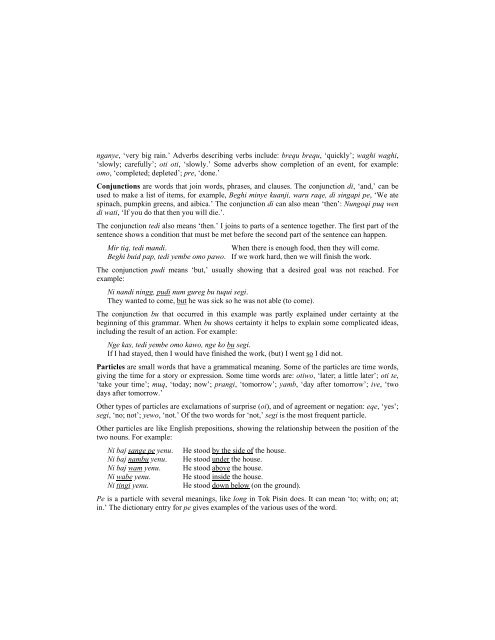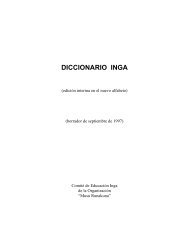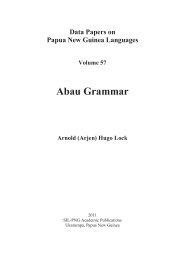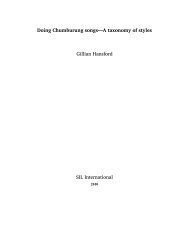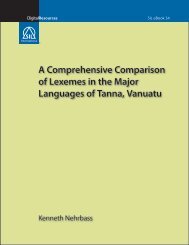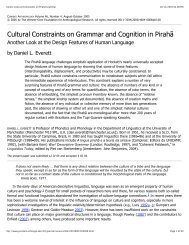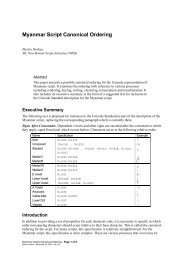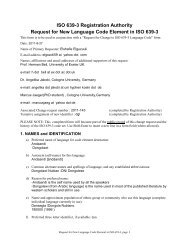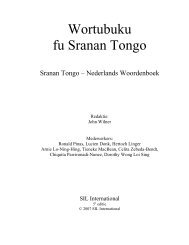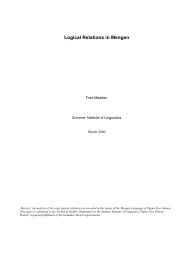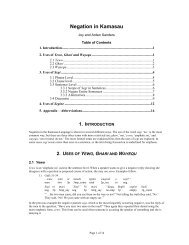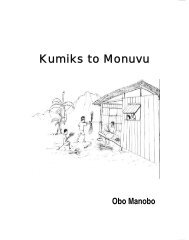- Page 1 and 2: Wand Tuan Wand Puate Kamasau Langua
- Page 3 and 4: This publication was made possible
- Page 5 and 6: Preface This tri-glot dictionary in
- Page 7 and 8: y a committee of Wand Tuan speakers
- Page 9: p 7 pu “pig” //not found// //no
- Page 13 and 14: 3) Things that are neuter or withou
- Page 15 and 16: A a abo nand vt he rebukes, scolds
- Page 17 and 18: ange nawo [angge nawo] vt he listen
- Page 19 and 20: awo namb vt he does sorcery; wokim
- Page 21 and 22: Ni kibar nde wuso. She went to her
- Page 23 and 24: Ngimrawu bi wuso pu yequ. The door
- Page 25 and 26: Ni muq gang nase pre, pugri bu ni b
- Page 27 and 28: Warbu quan nganye namb, broq no. Th
- Page 29 and 30: uid nap vt he tries hard; wok hat,
- Page 31 and 32: Ch ch chach n a general term for li
- Page 33 and 34: char n (dense) bush/jungle; bus Gh:
- Page 35 and 36: chirori n kind of worm that lives i
- Page 37 and 38: 1) adv very; tru Yabe chuqo koku ni
- Page 39 and 40: dig [dig] adj torn loose; broken of
- Page 41 and 42: Wapi nyoq dog rind. The bird egg do
- Page 43 and 44: E e ebu n type of tree whose large
- Page 45 and 46: G g gab n side; sait Wuny rand gab
- Page 47 and 48: gigriq [gigriq] n viscous substance
- Page 49 and 50: Gh: kri; H: minye 1) way; we Wen gr
- Page 51 and 52: Gh: mba nawo; H: nihinj, nihiri/paq
- Page 53 and 54: ghati ngrop [ghati nggrop] n type o
- Page 55 and 56: Beghi kuawu ghis pipiq. We cut off
- Page 57 and 58: imb nawo [imb nawo] vt to block; ba
- Page 59 and 60: 1) moon; mun Irew sawo pend pu kuse
- Page 61 and 62:
Non it yaq. Go ahead and eat it any
- Page 63 and 64:
J j jabin n stinging nettle with re
- Page 65 and 66:
jogro n decomposing body fluids of
- Page 67 and 68:
kamowo adj something little; liklik
- Page 69 and 70:
kimem [kimem] n his father's parent
- Page 71 and 72:
koku dobu n great grandparents on t
- Page 73 and 74:
Gh: kuamb piremo; H: kuamb pureq yi
- Page 75 and 76:
Nyombui pitare po, kuraip rit. We t
- Page 77 and 78:
mame gebich n a small sharp paring
- Page 79 and 80:
maribi part how; olsem wanem So: ma
- Page 81 and 82:
mi nar vi he is here under their au
- Page 83 and 84:
minye n a tree with paired edible l
- Page 85 and 86:
nei misiri: decide, thoughts become
- Page 87 and 88:
muai part where; we Gh: mai Nu muai
- Page 89 and 90:
mu nand vi perform magic, do magic;
- Page 91 and 92:
muqo nyony: thigh muscle H: muqo pe
- Page 93 and 94:
Mb mb mbajeri n a green or blue bee
- Page 95 and 96:
naimbni, nimbiqwi, nambri vt 1) he
- Page 97 and 98:
nange [nangge] part 1) above; antap
- Page 99 and 100:
nat vt it stings, bites (See also n
- Page 101 and 102:
nei nitraw vt he reminds someone ab
- Page 103 and 104:
nes newo vi stand up, get up, wake
- Page 105 and 106:
Pu teri riyi, mambui. Two pigs came
- Page 107 and 108:
ni nondo nandi vi it shakes; sekim
- Page 109 and 110:
Nge juwangiwo sare pe gijari. I str
- Page 111 and 112:
nisiri [nisiri] vt it hatches; piki
- Page 113 and 114:
Wuye lam pe nawo kughe. He filled t
- Page 115 and 116:
nungoqi pro you all, plural form of
- Page 117 and 118:
Nd nd nde part towards (a person);
- Page 119 and 120:
ngam nirang [ngam nirangg] vt he ca
- Page 121 and 122:
nge pro I, me; mi H: nevi Nge gadi.
- Page 123 and 124:
nginy viri vi it thunders when the
- Page 125 and 126:
Ny ny nyam nare vi he is fat; fatpe
- Page 127 and 128:
nye adj light colored, small amount
- Page 129 and 130:
Kar wapiqu nyinge wuwi nati. The ca
- Page 131 and 132:
munyi iny nyumo: a very tall tree w
- Page 133 and 134:
nyumo jibere n a tree with hard woo
- Page 135 and 136:
nyumo ndawgi [nyumo ndawgi] n a tre
- Page 137 and 138:
nyumo sunguari [sungguari] n a smal
- Page 139 and 140:
nyumbuagi n shells used for decorat
- Page 141 and 142:
O o obo n crotan, a plant used for
- Page 143 and 144:
umo ngawu/umo mbaq: tadpoles/polliw
- Page 145 and 146:
oti nireq vi he is slow; isi isi Gh
- Page 147 and 148:
P p pang [panggU/pangg] n a shell;
- Page 149 and 150:
pend ruso/di ruso n dawn, the first
- Page 151 and 152:
piyoq nand vi he makes something go
- Page 153 and 154:
prer newo vi Gh: prori newi; H: pre
- Page 155 and 156:
2) thus; used to indicate a number
- Page 157 and 158:
pugri adv thus; olsem 1) like that
- Page 159 and 160:
pureq nand vi Gh: pure nand 1) he i
- Page 161 and 162:
Q q qam, kiqam [kiqam], niqam [niqa
- Page 163 and 164:
Mame puate quang pe neq wuso. I gav
- Page 165 and 166:
Qi brequ wuse bu nyumo quari nase.
- Page 167 and 168:
quir quar rind vt surrounded, crowd
- Page 169 and 170:
qurur nand [qurur nand] vi it crack
- Page 171 and 172:
Nyumo raqe gub. The tree is in leaf
- Page 173 and 174:
Beghi ren badi. We have come here.
- Page 175 and 176:
S s sabi nand vt (See also oghisim
- Page 177 and 178:
sange [sangge] part beside; long sa
- Page 179 and 180:
sare tubrege n vine with small thor
- Page 181 and 182:
Beghi segine badi. We have brought
- Page 183 and 184:
Ni si gheyi nindig nandi. He motion
- Page 185 and 186:
Ni tami si wuang pu yenu. She desig
- Page 187 and 188:
sinyembe n Gh: tinyembe; H: hurembe
- Page 189 and 190:
sir nap vi he prepares; redim samti
- Page 191 and 192:
srang gud [srang gud] vi it makes a
- Page 193 and 194:
sunyi [sunyi/sungi] n Gh: tebu/tuny
- Page 195 and 196:
Wane wase bade suraip pe tongo pawo
- Page 197 and 198:
suwo qunang: bamboo shoots which pu
- Page 199 and 200:
tan n sword gras; kunai Gh: ndigh;
- Page 201 and 202:
Wute temi mo. The two men went. Nyu
- Page 203 and 204:
tighaw nimbiq [tighaw nimbiq] vi he
- Page 205 and 206:
tir [tir] n fibers on the inside of
- Page 207 and 208:
trang [trangg] n spider web Gh: tra
- Page 209 and 210:
tumb yamb no (See em yamb no) tung
- Page 211 and 212:
Beghi yaq gure pawo, tu wumb bab. W
- Page 213 and 214:
Umo ngrom wuye roru pe jiji ngamo r
- Page 215 and 216:
H: umbo uyi kuri 2) the heart: the
- Page 217 and 218:
KT- SI UNY: ritually unclean; han t
- Page 219 and 220:
urugu nand vi he flatters, he tries
- Page 221 and 222:
V v van nand [van nand/ghan nand] v
- Page 223 and 224:
wambi n a type of tree like a black
- Page 225 and 226:
wane yawa n a short yellow banana o
- Page 227 and 228:
wand pe nari vt he nags, complains
- Page 229 and 230:
H: wapi wend wapi amqase n the Spot
- Page 231 and 232:
wapi chambreru n a bird with a whis
- Page 233 and 234:
wapi growgraw [growgraw/mograw] n a
- Page 235 and 236:
Wapi kurighi ngape di gibe dobui ki
- Page 237 and 238:
wapi njomimur n Blue Jewel-babbler,
- Page 239 and 240:
wapi sambodrongyi/ngrowngrow n the
- Page 241 and 242:
wapi toqgir (See wapi saregrir) wap
- Page 243 and 244:
Ni tan sange pe yenu. They live on
- Page 245 and 246:
namb wase: firewood that is still b
- Page 247 and 248:
wase rangi [wase ranggi] n a sliver
- Page 249 and 250:
wonji/wonyqe part distant, a long w
- Page 251 and 252:
wuge kinyawo [wuge kinyawo] n the p
- Page 253 and 254:
wuraim n ligaments, blood vessels,
- Page 255 and 256:
KT- WUTE JISAS NEI RIMBIG YE: belie
- Page 257 and 258:
wuye meng/ququ meng [meng] n a mirr
- Page 259 and 260:
wuye suruq n top black palm sheath
- Page 261 and 262:
yambu nari vi he doesn't want to do
- Page 263 and 264:
yawo nindig [yawo nindig] vt he is
- Page 265 and 266:
yeng nand vi 1) it tastes bitter, h
- Page 267 and 268:
H: yihaq wuwi Wasebo kaq kaq yitaqw
- Page 269 and 270:
yuqo nati vi he hurts, feels pain;
- Page 271 and 272:
actually; bu adhere to something; t
- Page 273 and 274:
ack; dob back of cassowary and othe
- Page 275 and 276:
efriend; ane tambye wand behaviours
- Page 277 and 278:
aid with three strands; miet brain;
- Page 279 and 280:
cause; ngin namb caved-in-hole; gra
- Page 281 and 282:
coconut, green; iye ghar coconut, i
- Page 283 and 284:
curl; muet no curl the hair; mbret
- Page 285 and 286:
divide; bir nawo divorce; ngam puaq
- Page 287 and 288:
Emerald Monitor lizard; porowongren
- Page 289 and 290:
fire; wase fire goes out; awu no fi
- Page 291 and 292:
friend; mand, tambye frightening ex
- Page 293 and 294:
goura pigeon; wapi enju gourd for l
- Page 295 and 296:
heart wood; nyumo qurati heat leaf
- Page 297 and 298:
imitate someone; sonyi nand imitate
- Page 299 and 300:
labia majora; quare mim ladder; sin
- Page 301 and 302:
-spotted moniter; kuraip -used as f
- Page 303 and 304:
medium sized; kamo meet; pikur meet
- Page 305 and 306:
nearby; tumone nearly; tumo neck; g
- Page 307 and 308:
palm, edible; penjin palm leaf, cov
- Page 309 and 310:
point; si nundub pointer; si timi p
- Page 311 and 312:
put something in a bag; ni nase put
- Page 313 and 314:
(it) ripples; ideng kup rise up; yi
- Page 315 and 316:
sawdust; nyumo kinji, nyumo tinanji
- Page 317 and 318:
shrivel up; chuqapi no, mese namb s
- Page 319 and 320:
soon; yamb soot; wase ges (it is) s
- Page 321 and 322:
steps; sinyembe sternum; mand jari
- Page 323 and 324:
sweats; tuw nap sweep; breng wup sw
- Page 325 and 326:
threaten; woyungo nuang righe three
- Page 327 and 328:
-for medicine; nyumo moriwuany -for
- Page 329 and 330:
unconscious; rar ori nati uncooked;
- Page 331 and 332:
watch, guard; niringi water; wuye w
- Page 333 and 334:
wrist; si gubuq write; ur nand writ
- Page 335 and 336:
askim; pengu nand askim/askim laik
- Page 337 and 338:
ikpela kaikai; muanj bikpela liklik
- Page 339 and 340:
un bilong kumu; dubu bun bilong mur
- Page 341 and 342:
flai i go; nyingraiq no flaua; yomb
- Page 343 and 344:
H h haibiskas; ambomawi i hait/bani
- Page 345 and 346:
hul bilong nus; kime gawo hul bilon
- Page 347 and 348:
karim ananit long han; singap nand
- Page 349 and 350:
kru bilong het; ituwar kru bilong k
- Page 351 and 352:
lip bilong karamapim kaikai; mone l
- Page 353 and 354:
mango; sanyi manmeri; wute marit; n
- Page 355 and 356:
nek pas bilong morota; tu wumb nem;
- Page 357 and 358:
paitim pikinini; pug nindig pait lo
- Page 359 and 360:
planti lain manmeri; wute tit plant
- Page 361 and 362:
aunpela; mog raunwin; tembemo rausi
- Page 363 and 364:
save/tingting; nei namb i save; nut
- Page 365 and 366:
sol; sikar solap; buq rind, neri ne
- Page 367 and 368:
surikim i go; churoch nap, bres nap
- Page 369 and 370:
i tok gris; urugu nand tok gude lon
- Page 371 and 372:
wara bilong saksak; sawar wara bilo
- Page 373 and 374:
yupela; nungoqi yupela manmeri; wut
- Page 375 and 376:
abo; obo ade; ate, ede/nyembe amo;
- Page 377 and 378:
chambe; quongi ngam chambonar; samb
- Page 379 and 380:
es nand; ghes nand et; nyombui et w
- Page 381 and 382:
kainy; totu kamone; kamo gugo kamo
- Page 383 and 384:
memeri; priq nindoq meriyaru; mirai
- Page 385 and 386:
nambar; quet nambu; sumanyi nango;
- Page 387 and 388:
ngape riti [richi]; ngape riti ngap
- Page 389 and 390:
nyumo muanyguri; nyumo muanyenguri
- Page 391 and 392:
qang namb; quang namb qebari; imbri
- Page 393 and 394:
tebu/mueng; mong tebu/tunyi; sunyi
- Page 395 and 396:
toba tare; sare nyingi kis toi; cho
- Page 397 and 398:
umo qat kumo; qat kumo umo ranyi; u
- Page 399 and 400:
wapi digitchi/wapi nji chit; wapi d
- Page 401 and 402:
wate yat/wate chang; wase yas/wase
- Page 403 and 404:
ya yu/ ya dup; yaq yu yembe nand/ye
- Page 405 and 406:
abo; obo aboraw; ambomawi ah; at ah
- Page 407 and 408:
chihhumo; kiyitumo chiqe no; kangi
- Page 409 and 410:
habri yod; tab yuwod hagh ar; saw a
- Page 411 and 412:
hi nowi; si nowi hi nuang; si nuang
- Page 413 and 414:
huguag numbueg; yirir nimbig humb;
- Page 415 and 416:
iye minj; iye toquki iye unamb; iye
- Page 417 and 418:
minye ring huai; ngim suai minye ri
- Page 419 and 420:
ni tighe; ni nindighe ni/pug numbue
- Page 421 and 422:
nyambi har; nyaimb sar nyamyi prare
- Page 423 and 424:
pend rihi; di riti pend ruho; pend
- Page 425 and 426:
andi, wari; rand raq minye; ngimraw
- Page 427 and 428:
und nihiny; mosing uny wuho; uny wu
- Page 429 and 430:
wapi huonjawmo; wapi suwonjaw wapi
- Page 431 and 432:
wuge hagh ar; wuge saw ar wuge himi
- Page 433 and 434:
yumbo nyu; yumbo sir yumbo nyumo; n
- Page 435 and 436:
amaragi; kimechiraqyi ambongi; saw
- Page 437 and 438:
gureich no; gureq no ghaq nand; men
- Page 439 and 440:
mosimb; mosing muaing; muanj muarep
- Page 441 and 442:
obodinges; cheme podimo oghisim nan
- Page 443 and 444:
sirgoid; sirkewo soigi; segi soigin
- Page 445 and 446:
wane maqsari; wane meseri wane puan
- Page 448 and 449:
Scientific Words
- Page 450 and 451:
Geoffroyus geoffroyi/simplex; wapi
- Page 452:
Xanthosoma sagittifoliam; warbu Zos


